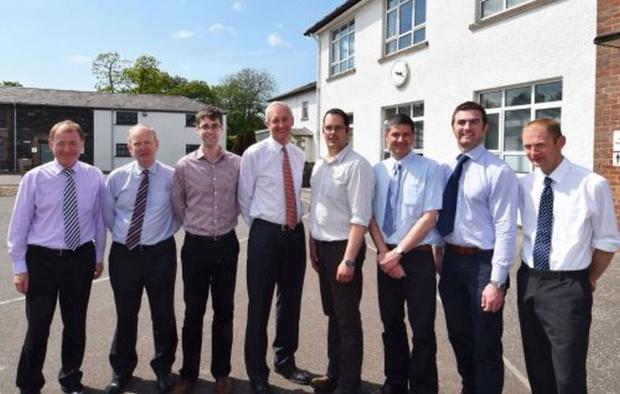The need for a renewed focus on maximising milk from quality forages was the overriding message at the recent Dairy Research seminar at the Agri-Food and Biosciences Institute (AFBI) at Hillsborough. Over 100 representatives from the local dairy sector attended the event, organised by AFBI Hillsborough, in partnership with AgriSearch.
The seminar took place within the context of current low milk prices, and the extremely difficult situation being faced by local milk producers. With no improvement in milk price forecasted for the immediate future, and recognising that there is relatively little that producers can do to change milk prices, the seminar focused on strategies to improve efficiency and control costs.
Dr Sinclair Mayne opened the seminar by highlighting the changes which have taken place within the local dairy sector in recent years, especially the reduction in milk from forage from 3250 litres per cow in 2000 to 1500 litres per cow in 2014. Sinclair’s challenge was that local farmers should seek to grow at least 12 t grass DM per ha per year, utilise at least 10 t per ha of grass grown when grazing, and produce 4000 litres per cow from forage.
Dr Steven Morrison highlighted how heifers represented the best genetics within the herd, and yet calf mortality on many farms was unacceptably high. This was attributed in part to the fact that many calves do not have an adequate intake of colostrum during their first 6 hours of life. Without adequate protection from antibodies in colostrum, calves are susceptible to health problems, and each incidence of poor health can have a negative effect on lifetime performance. Getting four litres of quality colostrum into each calf within six hours of birth is a target that producers should seek to meet.
An overview of recent research on winter feeding strategies was presented by Dr Peter Purcell, who concluded that feeding system was not the most critical issue, but rather the focus must be on getting concentrate feed levels correct, irrespective of which feeding system is adopted. Peter cautioned that use of high concentrate feed rates in feed-to-yield systems can result in milk fat depression with higher yielding cows. He suggested that concentrate allocations within a feed-to-yield system should be based on fat corrected milk yield, and not simply milk volume.
Dr John Bailey highlighted how AFBI research findings had been used to convince the European Commission that, in the case of fields with a phosphorus index at the lower range of Index 2, farmers should be allowed to add additional phosphorus (up to 15 kg more P2O5 per ha) to prevent a loss in herbage production. However, John also explained that poor water quality with respect to phosphorus was still a very real problem in Northern Ireland, largely due to increased phosphorus inputs from concentrate feedstuffs. Further improvements in reducing phosphorus losses from agriculture could be achieved by increased use of soil analysis and by using concentrates with a low phosphorus content (less than 5.0 g per kg).
While acknowledging that local weather conditions often made grazing management a challenge on local farms, Dr Andrew Dale argued that as grazed grass is our cheapest resource, we must seek to optimise the inclusion of quality pasture in dairy cow diets. His presentation highlighted the outcomes of a number of recent research studies which have sought to identify optimum concentrate feeding strategies, feed rates and realistic levels of performance sustainable from grazed grass. He finished his presentation by urging a renewed focus on making grazing systems ‘work’ for higher yielding cows, and acknowledged that this will require much more flexible grazing systems. When questioned on the role of zero grazing, Andrew acknowledged that this was recognised as an important research area.

The final presentation was given by Dr Conrad Ferris, who highlighted performance associated with four very different milk production systems. Milk yields within these systems ranged from just over 6000 kg to 9500 kg per cow. At a milk price greater than 27 pence per litre, a system involving the production of 8500 litres of milk from 2.5 t concentrate provided the greatest net margin per cow. However, when milk price was below 22 pence per litre, net margin per cow was greatest with a spring calving system producing 6500 litres from 0.85 t concentrate per cow. Conrad informed those attending that information on nutrient losses from each of these systems had been presented to the European Commission, and this had helped Northern Ireland achieve a renewal of the Nitrates Directive Derogation for a further four years.
During the day delegates also had the opportunity to visit the research farm at Hillsborough and to hear presentations from a number of postgraduate students and research staff. The overall consensus on the day, especially in view of current milk prices, was that Northern Ireland farmers should seek to produce more milk from quality forage. This will be one of a number of key messages that will be promoted at the AFBI Dairy Open Day on Wednesday 16 September. Further details of this event will be in the local press over the next few months.
Notes to editors:
AFBI carries out high quality technology research and development, statutory, analytical, and diagnostic testing functions for DARD and other Government departments, public bodies and commercial companies.
AFBI's Vision is “Scientific excellence in Northern Ireland … serving the world”.
All media enquiries to AFBI Press Office
Latest news
- AFBI issues Nematodirus warning – Spring 2025 11 April 2025
- Managing Nature Based Risks to the UK Economy and Opportunities for Green Finance 08 April 2025
- The Omics Days Conference 27 March 2025
- AFBI Hillsborough host AERA committee 27 March 2025
